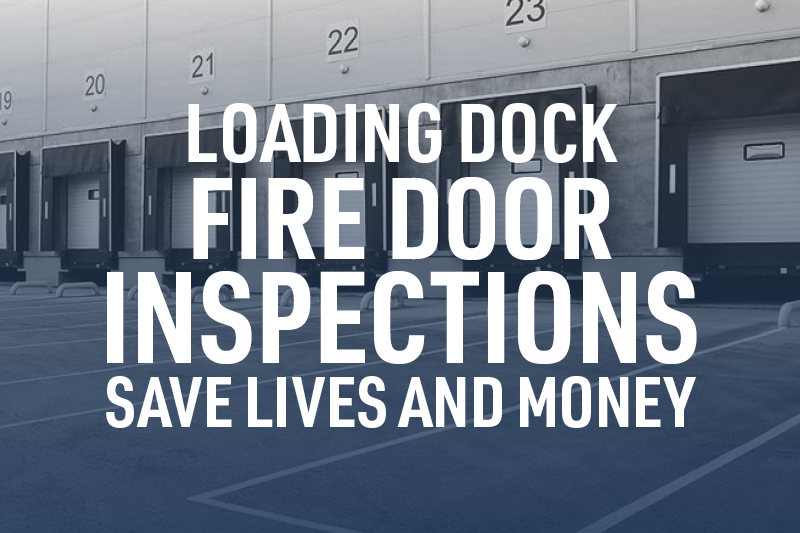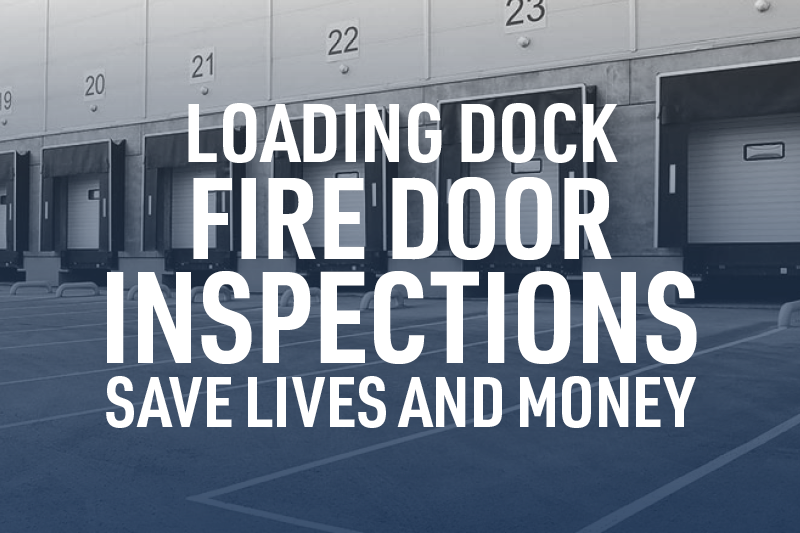3 min read
Loading Dock Fire Door Inspections Save Lives and Money
John Wofford
Aug 11, 2023 11:37:00 AM

 In the US, firefighters respond to an average of 1,450 warehouse fires every year. These fires are responsible for $283 million in damages, 2 deaths, and 16 injured workers annually. If those numbers feel small, you can thank the vigilance of organizations like the National Fire Protection Association.
In the US, firefighters respond to an average of 1,450 warehouse fires every year. These fires are responsible for $283 million in damages, 2 deaths, and 16 injured workers annually. If those numbers feel small, you can thank the vigilance of organizations like the National Fire Protection Association.
As recently as the 1970s, the annual death toll from fires was measured in the hundreds. Regulations like the requirement for fire door inspections play a significant role in reducing those casualties. Read on to learn more about annual fire door inspections and how they protect your facility.
What’s Required by NFPA 80?
The idea behind a fire door is genius in its simplicity. When in proper working order, fire doors compartmentalize your facility. They block fire and fumes from spreading while still allowing a clear evacuation route.
With regular preventative maintenance and annual inspections, loading dock fire doors are one of the best ways to protect your facility and staff. National Fire Protection Association (NFPA) standard 80 is a regulation that outlines the requirements for fire door inspections. This regulation mandates fire doors to be inspected annually and a signed certificate of that inspection to be kept on file for at least 3 years.
How Does a Fire Door Inspection Work?
On each anniversary of the loading dock fire door’s installation, a certified fire door inspector must test the door to ensure it remains in good working order. Testing is a multi-stage process that involves an evaluation of all working components. This includes the linkage that closes the door in case of a fire.
During this inspection, the loading dock door is subjected to a drop test. Among other factors, the door's closing speed is measured. To be certified, the door must close no slower than 6 inches per second and no faster than 24 inches per second. This ensures the door can be triggered and closed before a fire spreads, but not so quickly that it would injure anyone under it.
Once the door has passed testing, it is reset, lubricated, and marked with a decal. The inspector then provides a certificate for you to keep on file. This certificate must be presented upon request by the fire marshal or another certified codes inspector.
What Happens if a Fire Door Fails Inspection?
If a door fails inspection, it must be repaired. If you're working with an organization like The Lilly Company, your inspector may be able to schedule those repairs for you. Fire door repairs should be a top priority. The fire risk aside, your facility can be fined for uncertified doors. A fire marshal who inspects your facility will issue a $25,000 citation per uncertified door. Those fines add up quickly if you have more than one fire door without certification.
Additionally, the fire marshal may pull the occupancy permit for your building. This closes your facility until repairs and re-certification occur. After a favorable inspection from the fire marshal, you will then have to re-apply for your occupancy permit. In the end, this can end up costing millions in lost revenue.
How Do I Keep From Failing Fire Door Testing?
Preventative maintenance is the key to successful annual inspections. The annual inspection is a breeze if you've been staying on top of your loading dock fire door maintenance. Monthly maintenance is something your facilities team can do. Still, there are serious benefits to utilizing a fire door inspection service.
Professional fire door inspection services stay on top of local and federal fire codes. This ensures your doors are maintained to legal standards with no creep in quality. Also, professional organizations like The Lilly Company are insured for their work. That means any damages that arise from the quality of their maintenance are covered under their policy. This dramatically limits your liability and takes the headache out of fire door compliance.
Who Can Help Make Compliance Easy?
Lilly’s Dock and Door division is a full-service arm of The Lilly Company. They employ certified fire door inspectors, technicians, and installers. Their professional services cover the entire life span of your loading dock fire door, from installation through a lifetime of annual certifications. Their team offers regular preventative maintenance on every door they install, and they are qualified to inspect every type and brand of fire door on the market. When you work with Lilly Dock and Door, you get safety and compliance guaranteed. To learn more about NFPA fire door inspections, contact us online or visit one of our Mid-South locations:
Arkansas - Jonesboro
Alabama - Birmingham, Dothan, Irondale, Madison, Mobile, and Montgomery
Mississippi - Tupelo and Richland
Tennessee - Jackson, Memphis, Knoxville, and Kingsport
Further Reading
5 Simple Ways To Improve Loading Dock Safety & Efficiency
5 Signs It’s Time To Call A Dock Leveler Repair Technician
Dock Plate Vs. Pit Leveler – What’s The Best Option?
Posts by Tag
- Forklift (61)
- Forklift Service (19)
- Electric Forklifts (16)
- Forklift Safety (14)
- Forklift Attachments (12)
- Toyota Forklifts (12)
- Warehouse Planning (10)
- Parts (9)
- Warehouse Automation (8)
- Clark Forklifts (7)
- Loading Docks (7)
- Material Handling Education (7)
- Pallet Racking (7)
- Customer Solutions (6)
- Forklift Batteries (6)
- Forklift Rental (6)
- Purchasing Options (6)
- Aerial Equipment (5)
- Heavy Equipment (5)
- Forklift Accessories (4)
- Forklift Fleet Management (4)
- Forklift Tires (4)
- Forklift Training (4)
- Products (4)
- Utility Vehicles (4)
- Yard Spotter Trucks (4)
- Linde (3)
- Pallet Jacks (3)
- Specialty Forklifts (3)
- Used Equipment (3)
- IC Forklifts (2)
- Manitou (2)
- Warehouse Doors (2)
- COMBiLift (1)
- Custom Shop (1)
- Forklift Brakes (1)
- Forklift Warranty (1)
- Gehl (1)
- Komatsu (1)
- Product Review (1)
- Recruitment (1)











